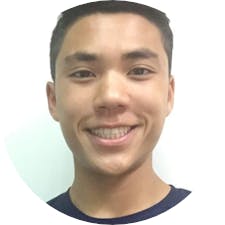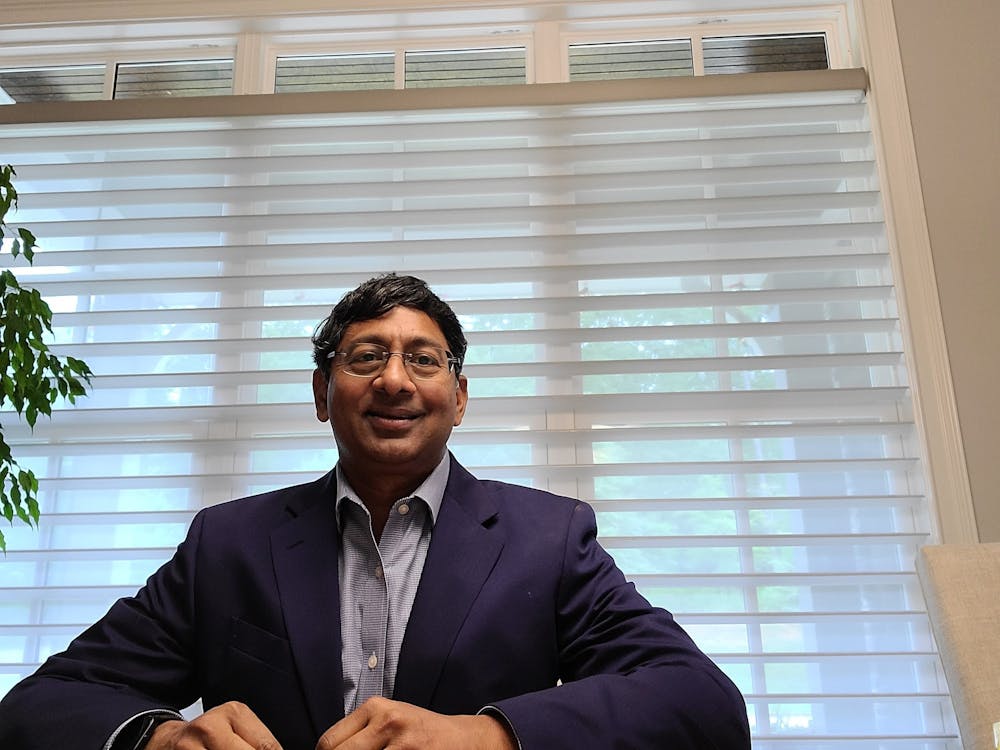When Ravi Bellamkonda moved from India to the United States on Aug. 26, 1989, he had only $800 with him. Bellamkonda, who is currently Vinik dean of the Pratt School of Engineering, had received a full-ride scholarship to pursue his doctorate at Brown University, but he wouldn’t start receiving funds for another six weeks.
Luckily, he had a friend in Austin, Texas who knew someone at Brown who knew two brothers—German computer science doctorate students—who let Bellamkonda crash at their place.
“I ate their cereal for a whole week,” he said.
Now, Bellamkonda is on the brink of another transition. He will be leaving the University in June to become provost and executive vice president for academic affairs at Emory University.
During his five years at Duke, Bellamkonda reshaped Pratt’s engineering curriculum by introducing a First-Year Design program that teaches students how to solve design problems through hands-on, team-based experiences. Bellamkonda also helped recruit and retain faculty and worked to expand the University’s diversity, inclusion and equity efforts. He is known for his deep empathy and his dedication to students’ holistic wellbeing.
“Ravi cares deeply,” said Jim Ruth, associate dean and director of development at Pratt. “He’s incredibly empathic; his emotional intelligence is absolutely off the charts. He’s incredibly open and invites all others to be open with him. … He defines ‘leader’ more than anybody else.”
***
When I called Bellamkonda in March, behind him were shelves packed with books. Growing up in India, he was a “crazy reader,” and though his family didn’t have a lot of money, they always found money to buy books.
His father worked for a federal agency that ensured price stability for Indian farmers. Every three years, his father was posted to a new city, so Bellamkonda and his sister grew up all over the country, attending seven different schools from kindergarten through high school. His mother stayed at home and helped the children transition from place to place.
“It taught me to be an outsider … going into new environments with a completely new language, with students who had been together for a long time in the class already,” he said.
By the time Bellamkonda graduated, biomedical engineering was still a relatively unknown major in Indian universities, with only a few schools offering it to undergraduates. Osmania University was one such school, and Bellamkonda received his Bachelor of Science in biomedical engineering from there in 1989.
Initially, going to graduate school in the U.S. wasn’t on Bellamkonda’s radar, but his friends were taking the GRE General Test, so he did, too. Then, Brown offered him a full-ride scholarship, and soon, Bellamkonda was in Providence, Rhode Island—8,000 miles from his family—eating cereal with two German guys. Calling home would have cost $3.56 for the first minute, he remembers, so he wrote letters instead.
At Brown, Bellamkonda pursued a doctorate in medical science and biomaterials and dove into research, working in a lab that studied how to repair nerves. He recalls having questions about nerve functioning that his adviser didn’t have answers to.
“So my adviser said, ‘Why don’t you design a set of experiments to find out?’ I was like, ‘You mean me?’” Bellamkonda said. “I didn’t even think of myself as a scientist, but he’s like ‘Yeah, design an experiment and find out.’ … And it was just amazing to me that as a first-year student, I was working on something that nobody in the world had an answer to.”
After earning his doctorate, Bellamkonda faced the choice of whether to work for a large multinational company or to enter academia. The former was the safer option.
“I remember talking to [my wife], saying, ‘This multinational company job, I think I know how to do that job. But this teaching job, I'm not sure if I’d be good at it,’” he said. He had never run his own lab, and he had doubts. Could he generate his own research ideas? Would he be able to supervise students effectively?
“‘I don’t have the answers to these questions,’” he told his wife at the time. “‘And so I’d like to find out by taking this job.’”
His wife thought he was crazy, but she still supported him in his decision, so Bellamkonda became an associate professor at Case Western University.
“I’ve always tried to be at the edge of what I know how to do and what I don’t know how to do,” he said.
Bellamkonda eventually taught biomedical engineering at Georgia Tech and then became the chair of Emory School of Medicine and Georgia Tech’s joint department of biomedical engineering in 2013.
Get The Chronicle straight to your inbox
Sign up for our weekly newsletter. Cancel at any time.
Becoming dean of Pratt was another risky decision—he hadn’t had that type of a role yet and didn’t know whether he would succeed—but he was fascinated with the idea of what an ideal engineering education should look like, and this was an opportunity to turn his ideas into reality.
“One of the major motivations for me to come to Duke was to see if Duke would be a place where we could run a few experiments, if you will,” he said.
***
One of Bellamkonda’s experiments has been restructuring the first year in Pratt to focus on training students to tackle various design challenges.
His goal was to “think about the undergraduate experience in engineering as a creative problem-solving exercise, and not as a … staying up until two in the morning eating stale pizza, just doing pushups and smelly socks kind of experience.”
The resulting First-Year Design curriculum consists of EGR101L and EGR190 and gives students hands-on experience with defining a design problem and coming up with a solution.
“The ability to brainstorm, really think outside the box, Ravi’s very comfortable with risk,” Ruth said. “One of the hardest things to do in academia is to change the curriculum. … But he was able to implement first-year design with the kind of notion of really supporting student interest in innovation and really creating this design spine through all four years of the undergraduate experience.”
Junior Brian Kang, who studies biomedical engineering, said EGR101L was a “really great way to get your feet wet with the engineering experience.”
“It’s a really unique class,” he said, “because it’s completely team-based and you have a client and real world application.”
Another of Bellamkonda’s experiments has been improving diversity at the University and in Pratt.
“The question is, ‘Is there a way that we can structure the undergrad experience that is more friendly to the creative types, to women, to underrepresented minorities?’” he said.
He helped establish Pratt’s Diversity, Equity, Inclusion and Community initiative, and he brought in a new director of diversity and inclusion in engineering for Pratt.
Growing up feeling like an outsider has given Bellamkonda empathy for those who don’t feel like they fit in. Junior Sydney Hunt, who is majoring in electrical and computer engineering and computer science, remembers Bellamkonda coming to a lunch she hosted for the Duke SPIRE fellows, a mentoring and academic support program for undergraduates from diverse backgrounds who are interested in studying STEM.
Except for Bellamkonda, all the attendees at the lunch were women, and the conversation focused on how the female students often felt out of place in Pratt.
“Dean Ravi doesn’t identify as female, but he still understood and heard us,” Hunt said. “He was very much talking about his own experiences about feeling the imposter syndrome or lack of representation of someone who identifies similar to you. And I think for me, that was the first time I really saw how genuine he was and how personal he was.”
Hunt also emphasized how deeply Bellamkonda cares about students’ wellbeing. He happily meets one-on-one with students, including both Hunt and Kang, offering advice about things like career paths and applications to medical school. But Bellamkonda also understands that success is about more than just academics.
“Everyone always says get sleep, eat right and exercise, but I feel like in Pratt it’s a very work hard, play hard environment, and [Bellamkonda] really wanted to emphasize the fact that before you can be an engineer, you have to be a person,” Hunt said, recalling a conversation with the dean.
Bellamkonda helped establish the Thrive course, a zero-credit, small-group course in Pratt that helps students prepare for rigorous academics and encourages them to pursue purpose and meaning and to cultivate holistic wellbeing.
When Bellamkonda speaks to classes or student groups, he tries to help people think about more than just what their peers often emphasize, like school ranking or a high-paying career, said Rebecca Simmons, associate professor of the practice in the department of mechanical engineering and materials science.
“He sees beyond that and says, ‘What do you want from your undergraduate career? How can we help elevate you? And how can we also help you contribute to Duke and the community? How do you want to contribute? Let’s figure out how we can help you do that, too,’” Simmons said.
The goal is for students to reflect on what success really means to them. Internships and a high grade point average are only means to an end, Bellamkonda said.
“Ultimately, my ambition for our students is that I’d like you, when you’re 50, or 60, or 70, to say, I’ve had a good life, and I’m happy with the person that I am. I’d like you to be able to say that with conviction,” he told me.
Living the good life, for Bellamkonda, requires a recognition of how scarce time is and how precious.
“Our time is finite. We all pretend that we live forever. We don’t like to think about mortality,” he said. “If time is the most precious thing I have, then I better use it wisely. And to me, each of us needs to ask and answer that question for ourselves, ‘What does it mean to use my time wisely?’”
***
Now, Bellamkonda’s time at Duke draws to a close. For a man who has always thrived with risk and innovation—being on the edge between known and unknown—the move to Emory is, in many ways, a natural one. He will have the opportunity to innovate at a university-wide scale. Still, he’s bittersweet about leaving.
“I love Duke and always will. I’ll always root for its success. Hopefully, somebody will find a way to give me a couple of tickets to Cameron after I leave,” he said.
“But at the same time, there is this excitement of trying to figure it out. Will I be good at my next job? Will I be able to help faculty and students and staff? Will I be able to have a positive impact as I would like to? We’ll find out. Another experiment is going to play out.”

Chris Kuo is a Trinity senior and a staff reporter for The Chronicle's 118th volume. He was previously enterprise editor for Volume 117.

